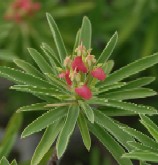UK Overseas Territories
- Home
- UK
Overseas Territories
- Biodiversity
- Threats
- Kew's historical links
- Ascension
- Anguilla
- Bermuda
- British Antarctic Territory
- British Indian Ocean Territory
- British Virgin Islands
- Cayman Islands
- Falkland Islands
- Gibraltar
- Montserrat
- Pitcairn Islands
- South Georgia
- Sovereign Base Areas on Cyprus
- St Helena
- Tristan da Cunha
- Turks and Caicos Islands
- Conservation activities
- Capacity Building
- Community involvement
- Links
- Contacts
UK Overseas Territories Programme
Turks and Caicos Islands: Kew Connections |
Activities in territory |
|
|
To understand more about its important wetland area, the Turks
& Caicos National Trust worked with several partners including
Kew to produce a 'Plan for Biodiversity Management and Sustainable
Development around Turks & Caicos Ramsar Site'. |
|
Monitoring invasive species |
|
|
During fieldwork in 2005, the team made a worrying discovery when it found an invasive scale insect,Toumeyella parvicornis, feeding on the native pine tree, Pinus caribea var. bahamensis. This was the first time this pest had been found in the Caribbean and the first record on this pine species. The insect feeds on the sap of pine trees and emits sugary honeydew. Black sooty mould grows on the honeydew and reduces the amount of light reaching the pine needles. In some parts of TCI's pineyards, 50% of the pine trees have died due to the infestation. We are currently developing an international working group and seeking funding for a Geographic Information Systems (GIS) study of the severity of the problem and to set up a pine nursery to propagate apparently immune specimens of the pine. |
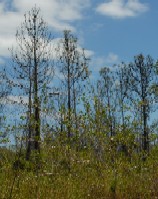 |
Seed collecting |
|
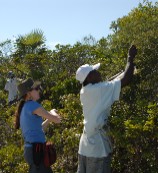 |
During fieldwork on TCI in 2006, seeds from 14 species were collected for storage in the Millennium Seed Bank. A continuing seed collecting programme is underway. Seedlings of two acacias unique to the islands are being grown on in the conservation collection at Kew for further study. Seedlings germinated at the Millennium Seed Bank as part of the seed viability testing process are being grown on at Kew for further study. |
Capacity building |
| Kew is active in building capacity for conservation within the UK Overseas Territories. Two islanders from the Turks and Caicos have taken part in Kew’s training programme, attending the International Diploma in Herbarium Techniques and the Darwin Initiative funded Threatened Plant Conservation course. Find out more about the International Diploma Courses |
Specimen under the spotlight: Acacia acuifera |
||
|
Acacia acuifera only grows in the Bahamas archipelago
including the Turks and Caicos Islands. It grows in coppice
around the coasts of the islands. Coppiced woodland occurs when
trees are regularly cut back to ground level with young shoots reappearing
from the trees' stumps. Its common name is pork and doughboy, possibly
describing the sausage-shaped fruits. The tree is a favourite food
source for the endemic Turks and Caicos rock iguana (Cyclura
carinata) which feeds on new leaves, flowers and ripe pods.
When the trees' seeds have passed through an iguana's digestive
system, any beetle larvae which might have infested them are killed
off and the seeds germinate more easily. Seeds collected from Acacia
acuifera have been put into storage at the Millennium Seed
Bank and seedlings resulting from germination trials are being grown
on at Kew for eventual display in one of the public glasshouses. |
||
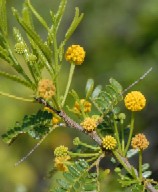 |
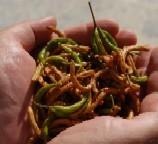 |
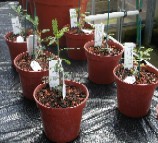 |
Find out more about Kew's activities and partner organisations in the Turks and Caicos Islands:Project: Plan for Biodiversity Management and Sustainable Development around Turks & Caicos Ramsar Site Partner: UK Overseas Territories Conservation Forum With funding from the Darwin Initiative Project: TCI Red List With funding from OTEP |


